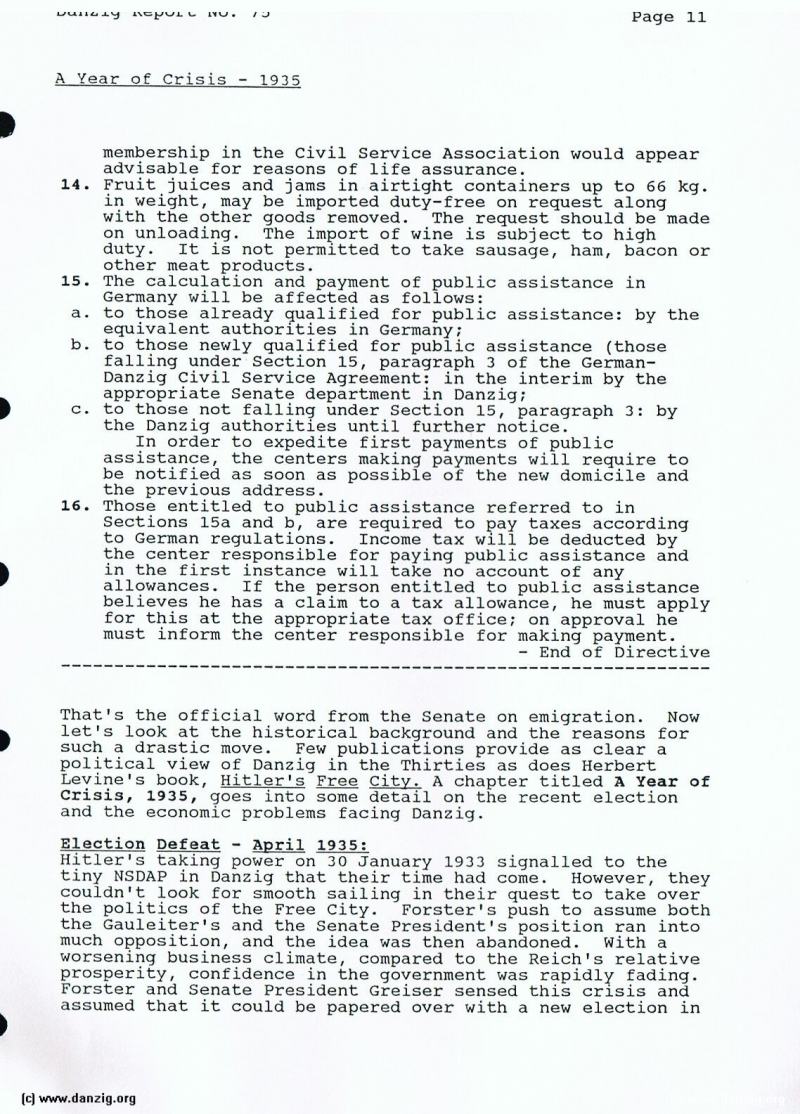
A year of Crisis - 1935
membership in the Civil Service Association would appear advisable for reasons of life assurance.
14. Fruit juices and jams in airtight containers up to 66 kg. in weight, may be imported duty-free on request along with the other goods removed. The request should be made on unloading. The import of wine is subject to high duty. It is not permitted to take sausage, ham, bacon or other meat products.
15. The calculation and payment of public assistance in Germany will be affected as follows:
a. to those already qualified for public assistance: by the equivalent authorities in Germany;
b. to those newly qualified for public assistance (those falling under Section 15, paragraph 3 of the German— Danzig Civil Service Agreement: in the interim by the appropriate Senate department in Danzig;
c. to those not falling under Section 15, paragraph 3: by the Danzig authorities until further notice.
In order to expedite first payments of public assistance, the centers making payments will require to be notified as soon as possible of the new domicile and the previous address.
16. Those entitled to public assistance referred to in Sections iSa and b, are required to pay taxes according to German regulations. Income tax will be deducted by the center responsible for paying public assistance and in the first instance will take no account of any allowances. If the person entitled to public assistance believes he has a claim to a tax allowance, he must apply for this at the appropriate tax office; on approval he must inform the center responsible for making payment.
- End of Directive
That’s the official word from the Senate on emigration. Now let’sl ook at the historical background and the reasons for such a drastic move. Few publications provide as clear a political view of Danzig in the Thirties as does Herbert Levine’s book, Hitler’s Free City. A chapter titled A Year of Crisis, 1935, goes into some detail on the recent election and the economic problems facing Danzig.
Election Defeat - April 1935:
Hitler’s taking power on 30 January 1933 signalled to the tiny NSDAP in Danzig that their time had come. However, they couldn’t look for smooth sailing in their quest to take over the politics of the Free City. Forster’s push to assume both the Gauleiter’s and the Senate President’s position ran into much opposition, and the idea was then abandoned. With a worsening business climate, compared to the Reich’s relative prosperity, confidence in the government was rapidly fading. Forster and Senate President Greiser sensed this crisis and assumed that it could be papered over with a new election in
Danzig Report Vol. 1 - Nr. 75 - April - May - June - 1992, Page 11.
Hits: 3467
Added: 02/07/2015
Copyright: 2025 Danzig.org

